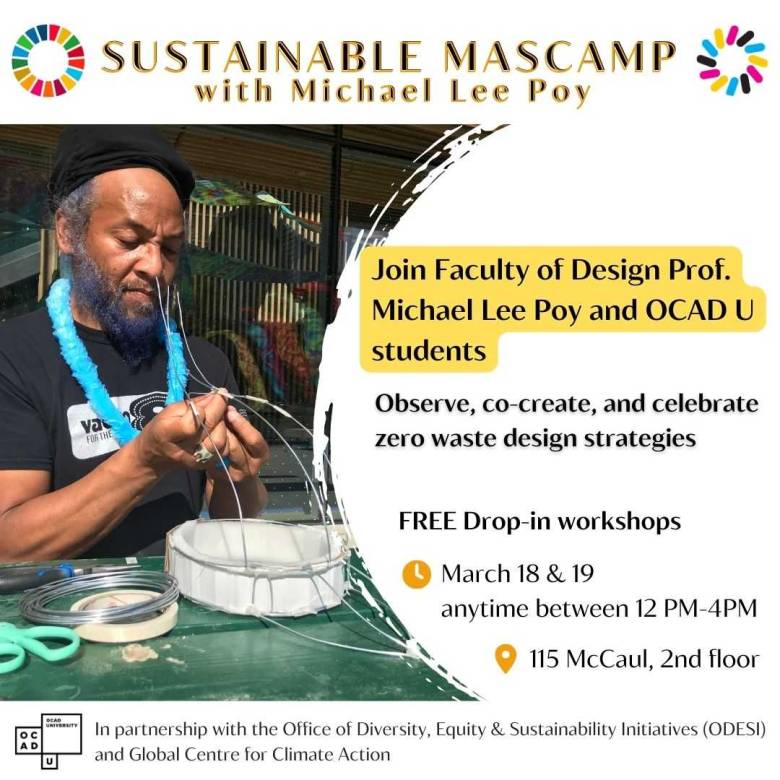
Procession and Performance: Open to the Public
Friday March 24, starting at 5 p.m. at 100 McCaul St., Lobby.
Come experience Faculty of Design Professor Michael Lee Poy and his student-focused learning journey that centers experiential learning tools for creative carbon footprint reduction to combat climate change through art and design practice. The sustainability (opening/vernissage/activation/kambule) will be initiated by Raging Asian Womxn Taiko Drummers (RAW) an all-womxn Taiko drumming group based in Toronto that uses their creative expression as resistance for social change, carving space for self-expression, education and community building. The procession will amplify the importance of sustainability and climate change through creative use of existing waste. A mixture of traditional Carnival fabrication and exhibition techniques will be used to activate the procession: silk banners and flags; Moko Jumbie (stilt dancer); wire bending; bone/rib construction; bonding agents; mechanical connections, avatar/hero creation; sound scaping; call and response; scale/gesture/movement.
The parade follows a series of workshops that happened in March where students, faculty and staff created upcycled Mas costumes with Faculty of Design Professor Michael Lee Poy at the Sustainable Mascamp Open Studio.
Background
Since the late 17th century in Trinidad and Tobago, the carnival mascamp (masquerade camp) has been the engine room for design innovation—where every year fantasy themed costumes, theatre, music and dance have been workshopped and created to create a single Carnival Band. Each band collective is made up of many sections and each section tells its own story culminating in the fantastical Mardi Gras street performance.
A polyglot of cultures and interdisciplinary creative practices emerged in the Southernmost Caribbean islands due to colonial forced migrations, geopolitical maneuverings, and the Emancipation Proclamation of 1833-38. The French, English, Portuguese, Chinese, Venezuelan, Syrian, Lebanese, Creoles and African communities were inspired to participate in a modern day version of West African masquerade traditions.
Trinidad and Tobago Carnival has mushroomed throughout the Caribbean diaspora in New York, Miami, Atlanta, Toronto, Montreal, London, and many other cities around the world. And with it an unsustainable production of single use plastic food and beverage containers and globally sourced costume materials destined for landfills and oceans. Attempts to mitigate the environmental abuse have been negligible as thousands of tons of plastics are rarely recycled or upcycled and end up in landfills. The impacts on small island nation ecosystems compounded by the dearth recycling programs are disastrous to coastal communities. Despite the popularity, tourism-dollars dependency, and international growth of the Caribbean derived festival, no institution has addressed the imminent catastrophic dangers that Carnivals pose on the health and survival of the environment. This OCAD U workshop delves into the complexity of large-project art sustainability, tourism, and the fragility of island nation ecosystems.
Presented by the Office of Diversity, Equity & Sustainability Initiatives (ODESI) and the Global Centre for Climate Action (GCCA).
For more info, email Victoria Ho, Advisor, Strategic Sustainability, Office of Diversity, Equity & Sustainability Initiatives, at vho@ocadu.ca.